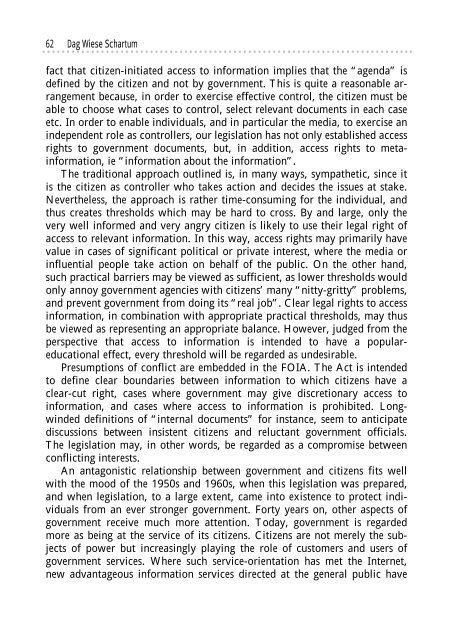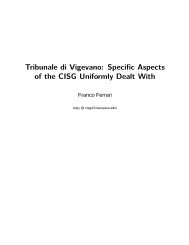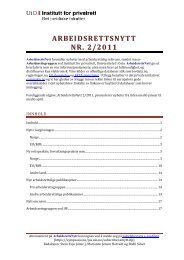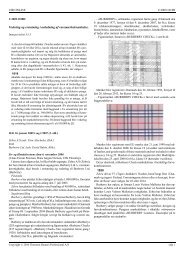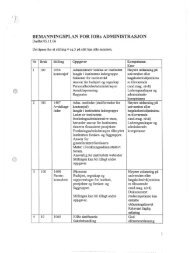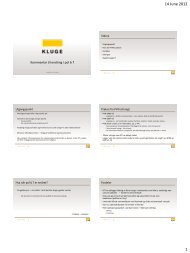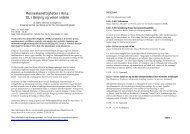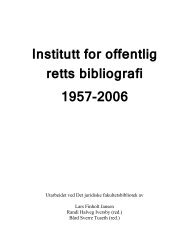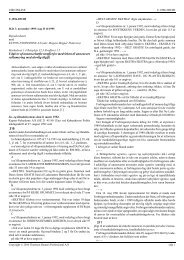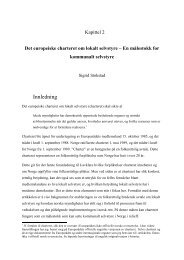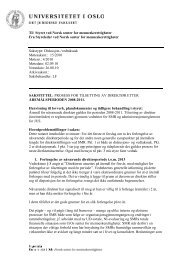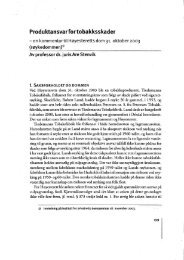Lee A. Bygrave (red.) YULEX 2002 - Universitetet i Oslo
Lee A. Bygrave (red.) YULEX 2002 - Universitetet i Oslo
Lee A. Bygrave (red.) YULEX 2002 - Universitetet i Oslo
You also want an ePaper? Increase the reach of your titles
YUMPU automatically turns print PDFs into web optimized ePapers that Google loves.
............................................................................<br />
62 Dag Wiese Schartum<br />
fact that citizen-initiated access to information implies that the “agenda” is<br />
defined by the citizen and not by government. This is quite a reasonable arrangement<br />
because, in order to exercise effective control, the citizen must be<br />
able to choose what cases to control, select relevant documents in each case<br />
etc. In order to enable individuals, and in particular the media, to exercise an<br />
independent role as controllers, our legislation has not only established access<br />
rights to government documents, but, in addition, access rights to metainformation,<br />
ie “information about the information”.<br />
The traditional approach outlined is, in many ways, sympathetic, since it<br />
is the citizen as controller who takes action and decides the issues at stake.<br />
Nevertheless, the approach is rather time-consuming for the individual, and<br />
thus creates thresholds which may be hard to cross. By and large, only the<br />
very well informed and very angry citizen is likely to use their legal right of<br />
access to relevant information. In this way, access rights may primarily have<br />
value in cases of significant political or private interest, where the media or<br />
influential people take action on behalf of the public. On the other hand,<br />
such practical barriers may be viewed as sufficient, as lower thresholds would<br />
only annoy government agencies with citizens’ many “nitty-gritty” problems,<br />
and prevent government from doing its “real job”. Clear legal rights to access<br />
information, in combination with appropriate practical thresholds, may thus<br />
be viewed as representing an appropriate balance. However, judged from the<br />
perspective that access to information is intended to have a popula<strong>red</strong>ucational<br />
effect, every threshold will be regarded as undesirable.<br />
Presumptions of conflict are embedded in the FOIA. The Act is intended<br />
to define clear boundaries between information to which citizens have a<br />
clear-cut right, cases where government may give discretionary access to<br />
information, and cases where access to information is prohibited. Longwinded<br />
definitions of “internal documents” for instance, seem to anticipate<br />
discussions between insistent citizens and reluctant government officials.<br />
The legislation may, in other words, be regarded as a compromise between<br />
conflicting interests.<br />
An antagonistic relationship between government and citizens fits well<br />
with the mood of the 1950s and 1960s, when this legislation was prepa<strong>red</strong>,<br />
and when legislation, to a large extent, came into existence to protect individuals<br />
from an ever stronger government. Forty years on, other aspects of<br />
government receive much more attention. Today, government is regarded<br />
more as being at the service of its citizens. Citizens are not merely the subjects<br />
of power but increasingly playing the role of customers and users of<br />
government services. Where such service-orientation has met the Internet,<br />
new advantageous information services directed at the general public have


